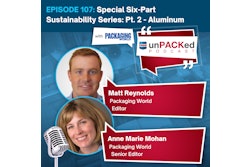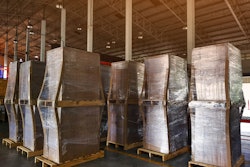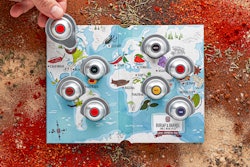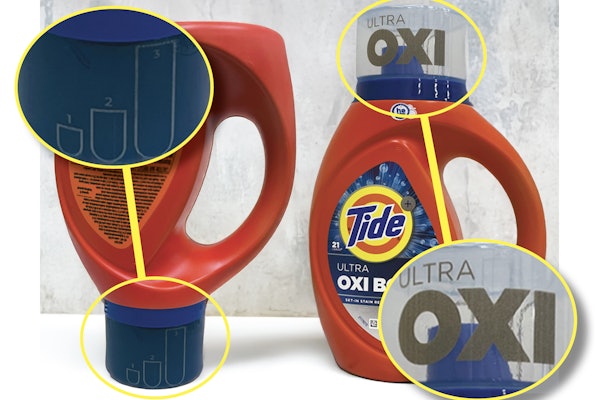Advanced recycling kicks off part one of a six-part sustainability sit down with Packaging World editors Anne Marie Mohan and Matt Reynolds. Mohan and Reynolds cover sustainability and packaging materials daily for Packaging World and rank among the most knowledgeable in the packaging and processing industry on current trends and breakthroughs. In this episode, the pair discuss how advanced recycling could be the next step in ensuring packaging sustainability, as it focuses on breaking down difficult-to-recycle materials to a molecular level before reuse.
Sean Riley:
And with all the fancy introductions out of the way, welcome to the podcast Anne Marie Mohan and Matt Rattles. Welcome, Anne Marie.
Anne Marie Mohan:
Nice to be here, Sean.
Sean Riley:
Welcome, Matt.
Matt Reynolds:
Thanks for having me.
Sean Riley:
The pleasure is all mine. Now, because I'm a very well-read individual, I'm familiar with the latest in recycling advanced chemical molecular, but for all of our listeners out there, can you guys kind of give us some bullet points, some 30,000-foot view on exactly what it is, and I guess the differences between advanced chemical or molecular recycling?
Matt Reynolds:
Sure. Currently, the most common system of recycling is called mechanical recycling, but what's emerging right now is a technology, it's what's called advanced or chemical or molecular recycling. In fact, advanced and molecular are pretty much synonymous. They mean the same thing interchangeably. Chemical recycling is sort of a subset within.
The big picture is that, through advanced techniques, sometimes using heat, sometimes using solvents, various other chemical or molecular techniques, folks are able to reduce plastics, or actually anything, down to its basic building blocks. When we talk about plastic, we're talking about polymers. We're reducing them down to what would be called a monomer, like a single individual unit that can then be built back up into whatever the product might be.
Now, one really great advantage of it with mechanical recycling, you tend to have what has to be downcycling. If you have a milk carton that's polypropylene, for instance, that might be recycled, but it won't be recycled into another milk carton, it'll most likely be recycled into a swing set, or a decking might be another one that's pretty frequent, because over time it degrades.
With molecular recycling, using the most basic building blocks, taking any material ... including let's say ocean plastics or degraded plastics, degraded materials ... you're able to basically push those down to their lowest building blocks and then build them back up to potentially upcycle to have equivalent divergent plastics where something that's been ocean plastic, or anything that's been degraded can still get built back up by these scientists, essentially—
Sean Riley:
Right.
Matt Reynolds:
To become PET equivalent, one-to-one replacement for PET. So, that's great. Consider uses for food contact, for instance. Years and years of mechanical recycling for a given plastic, eventually degradation is going to occur where that plastic, after recycling, is not going to be suitable for food contact, but you're able to take even lower grade plastic waste and then recreate virgin plastic, food-contact-ready plastic out of that, then that's a wonderful silver bullet type of technology to have. And then also consider the ease of use for ... Some of these technologies are what's considered, I guess it would be mixed waste, so it could take all sorts of different kinds of waste, and the ease of use, ease of recycling for the consumer, and the more the likelihood of the consumer to successfully recycle is much greater in that case. That's kind of the big picture. I won't get into the weeds on the molecules there, but that's what's going on.
Anne Marie Mohan:
One recent example where a brand owner ... and it was Unilever ... was able to use a recycled polypropylene for a food product, whereas in the past, with mechanically recycled polypropylene, it was not approved for food contact, was for their Magnum ice cream tubs. SABIC is a chemical producer, and they produce the feedstock for those tubs from recycled materials done by plastic energy through pyrolysis, so they're using advanced recycling to create the building blocks for this polypropylene, and it has the same functionality and properties as virgin polypropylene. And even one step further, which is very interesting, is for this product there's a chocolate shell around the ice cream inside, so they had to retain that iconic feature, so they had to make sure it had the same flexibility, and they were able to accomplish that. They could not have used recycled polypropylene from a mechanical process.
Sean Riley:
Interesting.
Anne Marie Mohan:
So, it did open the door for recycled materials in that application.
Sean Riley:
Okay, cool. So, then, I guess with that in mind ... that kind of segues in perfectly ... is there potential to replace and ... I'm not even going to try to pretend that I know ... I know what MRF is, but I don't know what the MRF stands for. Is that machine—
Matt Reynolds:
Materials recover facility.
Sean Riley:
All right, MRF. So, I understand the technology, I understand how it works. Is there a potential for ... using that Magnum as an example ... for this to either replace or take some of the load off of traditional mechanical recycling, which is MRF?
Matt Reynolds:
I think the intention is definitely to take some of the load off, at least as it scales up. Now, 50 years from now, or 100 years from now, maybe that's different, but right now it's definitely meant as a complimentary technology, because there are some things that mechanical recycling can do quite well, so don't break what's not broken [inaudible 00:05:18].
Sean Riley:
So, it's not an either/or.
Matt Reynolds:
It would be supplemental. I could imagine a MRF of the future having an arm that was doing mechanical, and an arm that was doing advanced recycling, or within any given municipality, you could have both, with differing materials following those streams, but right now, in terms of it scaling up, it's definitely complimentary in nature.
Sean Riley:
With it being complimentary [inaudible 00:05:42] people that are attempting to do this now, or is it more of a, "Boy, this is a great goal to have"?
Anne Marie Mohan:
I think it's both. There are some companies that are using molecularly recycling plastics at the moment, like Magnum. There are some technologies that are still at a stage where they're not available, or they're not at scale, but they're definitely examples in the market. Another one is also done by SABIC, and it's with Mars; it's their Sheba cat food pouches. This is an interesting application, because it's food contact safe, but it also can withstand the high heat of the retort process, so they really made a huge step in that regard. And it uses mixed waste, so you can use all kinds of plastic packaging to create, through pyrolysis, the building blocks for new plastics.
Sean Riley:
Interesting. So, I think you kind of answered this, but is it just one way to do this?
Matt Reynolds:
There's a lot of ways to skin this cat, molecularly skin it. So, just to go off ... There's a list, so—
Sean Riley:
We just fed a cat, and now we're harming a cat, but we love cats. We have no problem with cats.
Matt Reynolds:
It's Schrodinger's cat. It neither exists or does not exist.
Sean Riley:
Yeah.
Matt Reynolds:
So, I mean, they can use things like enzymes and microorganisms to basically break down ... Solvents are used frequently. You mentioned pyrolysis, so heat can be used. There's a term, flash joule heating is one, but they all kind of ladder up into three major categories, and one of those is purification, one is de-polymerization, and one is conversion. Those are the three primary ones. We're seeing probably the most early legs with the polymerization, just in terms of numbers of cases. I know another big one is Eastman does a version of this, and they work with Procter & Gamble on Herbal Essences, so it's a pretty big brand.
Sean Riley:
Sure.
Matt Reynolds:
On a bottle that is entirely made from molecularly recycled, depolymerized PET. So, again, I don't know if that was coming from ... I don't know if the feed stock was there. I don't know if that was PET to PET, for instance, or it could have been anything, but regardless, the end product looks identical to the existing bottle, and functions the same as well. That's one example. I know there's a Korean cosmetics prestige brand that I cannot name because I would butcher the pronunciation of it.
Sean Riley:
[inaudible 00:08:16] as of yet.
Matt Reynolds:
As of yet. I'll work on it. But, that's another ... Amorepacific is the brand owner, at least, and that's another Eastman category. Honeywell has a few of its own.
Anne Marie Mohan:
There's one technology, and I can't recall which of the three main categories it falls under, but they use enzymes to recycle these materials, and one very interesting application that I talked about recently, or wrote about, was one with a company called LanzaTech. They worked with L'Oréal on a prototype bottle for a personal care product where they're actually capturing the emissions from a steel mill and using enzymes to then create ... They call it a trash-to-treasure process, where they turn that carbon waste into new products using a biological process. That, to me, is fascinating. It's still just a prototype, but they are working on other applications that are in market now. LanzaTech, that is, not L'Oréal, although they are ... L'Oréal is working on other things as well.
Sean Riley:
We know food is the biggest thing that's packaged, at least that we deal with, good and beverage. Are there other examples of where it's making its way food contact type packaging, beside the Magnum and the cat food that you mentioned earlier?
Anne Marie Mohan:
There is one technology, and I think it falls under conversion, but it's a technology that's really being touted by Professor Bruce Welt at University of Florida. It's called Regenerative Robust Gasification. That's kind of like the holy grail. It can take any plastic, and every output of that process can be used for something; perhaps not packaging, but for other applications. And what results from this process is called pyrolysis oil, and any kind of plastic that you want to create for packaging will be able to be made from this process. And he's now working with the Flexible Packaging Association to do trial runs at the University of Florida to kind of see ... They're doing it by a ton of waste to see what the output is.
Sean Riley:
So, that [inaudible 00:10:41] every aspect. We're talking like it's every emission that comes from breaking it down, it being broken down, everything? "This bag is going to be completely repurposed into something else," is basically what you're saying?
Anne Marie Mohan:
Yes.
Sean Riley:
And that's what the good doctor is working on.
Matt Reynolds:
Meanwhile ... I mentioned Honeywell earlier. Honeywell is another one, again falling within these three categories, but instead of going strictly with the pyrolysis route, they do some of that, some with the heat, but they also use different chemical and solvent ways about it. They call it upcycling, which is ... It's the accurate term, because again, it could be garbage in that you get virgin PBT or virgin material out of, and that virgin material is ostensibly the same. I mean, it is virgin material. And they've got a new client that's actually opening in Spain coming soon, so we're seeing some ... Definitely some early adopters are getting on, both from the brand side and from the provider's side, supplier's side.
Sean Riley:
Do you guys think ... And again, this is opinion, not fact ... this is something that continue to roll out slowly, or do you think it will be something where it falls over the edge once it kind of catches on? Or is it something we're probably going to continue to see slow rollouts of?
Anne Marie Mohan:
I believe the rollouts will be slow because it requires such a huge investment for these chemical recycling plants or molecular recycling plants, so I think there is a lot of energy going into R & D, a lot of pilots, but it'll take time for these to scale up. But, I think it's the future. I think it definitely has legs, and it's something we'll see more of.
Matt Reynolds:
And think about all the [inaudible 00:12:23] that have ... they're scrambling to meet their 2025, 2030 goals and so on. This is just another tool in the toolbox when these facilities all come online. And think about the pressure it could take off of things, like films and so on, that right now, our ... It's a great program, the score drop-off, but what if you don't have to do that? What if that responsibility that's currently on the consumer is removed because everything goes into mixed waste, and it can be molecularly recycled into something that would be equivalent to virgin, so a lot of the onus shifts there, and there's a lot of reasons, a lot of very interested parties and stakeholders that I could greatly benefit from.
Sean Riley:
And I would think it would also make it easier for the consumer, which is going to kick off all these recycling to begin with, to have one way to be able to do that, so that's a good way to kind of put a button on this discussion of ... Was it advanced molecular, and what was ...
Anne Marie Mohan:
Chemical?
Sean Riley:
Chemical! Advanced chemical and molecular recycling. So, once again, thank you Anne Marie, thank you Matt, and I assure all the listeners at home that we love cats. We love Pete. We're very pro cat here, and no cats were skinned or harmed in the making of this podcast

























